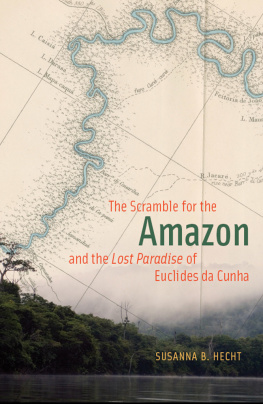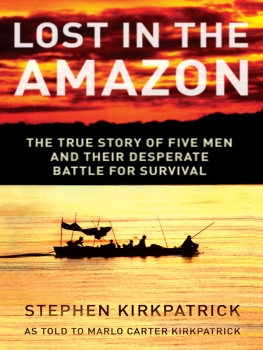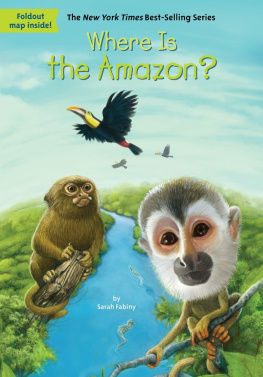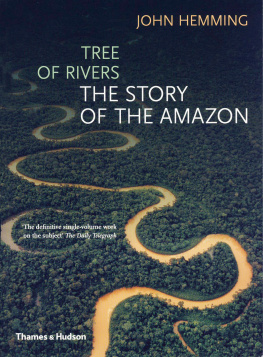The Scramble for the Amazon and the Lost Paradise of Euclides da Cunha
SUSANNA B. HECHT
The University of Chicago Press
Chicago and London
SUSANNA B. HECHT is professor in the Luskin School of Public Affairs, Institute of the Environment, and Department of Geography at the University of California, Los Angeles. She is coauthor of Fate of the Forest, also published by the University of Chicago Press.
The University of Chicago Press, Chicago 60637
The University of Chicago Press, Ltd., London
2013 by Susanna B. Hecht
All rights reserved. Published 2013.
Printed in the United States of America
22 21 20 19 18 17 16 15 14 13 1 2 3 4 5
ISBN-13: 978-0-226-32281-0 (cloth)
ISBN-10: 0-226-32281-5 (cloth)
ISBN-13: 978-0-226-32283-4 (e-book)
Library of Congress Cataloging-in-Publication Data
Hecht, Susanna B.
The scramble for the Amazon and the Lost paradise of Euclides da Cunha/Susanna B. Hecht.
pages ; cm
Includes bibliographical references and index.
ISBN-13: 978-0-226-32281-0 (hardcover : alkaline paper)
ISBN-10: 0-226-32281-5 (hardcover : alkaline paper) 1. Cunha, Euclides da, 18661909. 2. Cunha, Euclides da, 18661909TravelAmazon River Region. 3. BrazilHistory1889 4. Amazon River RegionHistory19th century. 5. Rio Branco, Jos Maria da Silva Paranhos Jnior, Baro do, 18451912. I. Title.
F2537.C97554H33 2013
981'.1dc23
2012027399
 This paper meets the requirements of ANSI/NISO Z39.48-1992 (Permanence of Paper).
This paper meets the requirements of ANSI/NISO Z39.48-1992 (Permanence of Paper).
Constantly braiding, diverging, intersectingjust like the Purs in its great meanders of life: it is to my sister Holly Ebel and my brother Thomas Hecht that I dedicate this book.
Let them fantasize, of winds leaping
From wine-skins and of amorous Calypso;
Harpies who foul their own banquets;
Pilgrimages to the underworld;
However they polish and decorate
With metaphor and such empty fables
My own tale in its naked purity
Outdoes all boasting and hyperbole.
LUIS VAZ DE CAMES, The Lusiads
In that indefinable compoundthe BrazilianI came upon something that was stable, a point of resistance reminiscent of the integrating molecule in the initial stages of crystallizations. And it was natural enough that, once having admitted the bold and inspiring conjecture that we are destined to national unity, I should have seen in those sturdy caboclos the bedrock of our race.
EUCLIDES DA CUNHA,
Introduction to the 1905 edition of Os Sertes
Acknowledgments
This book begins in the Amazon basin, where I first encountered da Cunhas prose. I felt that no one had seen or written on the Amazon as luminously, and I was annoyed and upset that so little was known about him and his Amazon life. In some ways my entanglement with him was a natural outgrowth of the study of nineteenth-century naturalists that I had begun as a graduate student under the great historian of environmental philosophy and geographic thought Clarence Glacken. I suppose this volume can be seen in some way as revisions of a paper I began with him. Another long-standing debt is to the late Hilgard OReilly Sternberg, my dissertation chair, whose interest in the Belgian history in the Amazon was my first intimation of the scramble. I also thank Barbara Weinstein, doyenne of the Amazon rubber economy. Our conversations as graduate students at the Museu Goeldi still echo throughout this work, as well as those with activist scholar Marie Allegretti. Other analysts of the Upper Amazon, including Francisco Santos-Granero, Peter Gow, and Miguel Pinedo-Vsquez, recast my thinking about the landscape and history of the Peruvian Purs.
This books formal life actually began in the garage of neighbor Casey Kelley after my house was destroyed in the Northridge earthquake. I resided in her Airstream trailer and used her capacious garage as my office, surrounded by boxes of my worldly life while I watched my rubbled house go from dumpster to reconstruction. In many ways Casey is the patroness of this work, all the more so since she did this not from neighborly obligation but from the very goodness of her heart. There were others who continued along, encouraging, providing the moral support, meals, and solace that were necessary for the reconstruction of a life and a house and the writing of a book. My neighbors Charlie Lockwood, Dan and Martha Seeger, and Uschi Obermeyer provided dog walks and the pleasures of daily life. Robert Wayne and Blair Van Valkenberg, Judith Carney, Richard Rosimov, Stephanie Pincetl, and Jonathan Katz fed and cheered me on. Joe and Karen Paff and Tally Wren of Petrolia, California, were happily gossipy, and Joe especially always demanded that one keep up with Schopenhauer. Craig Storper provided a lot of telephonage and was always happy to talk long hours with me about everything from craft to lawsuits. Longtime confrere Michael Storper provided shelter from the storm when the winters made Caseys garage too cold, and his always effective jaundiced eye cauterized any lapse into sentimentality. Sassan Saatchi and Leila Farzani kept cooking and throwing parties that made all our lives better. Melissa Savage was an encouraging and loyal friend.
Alberto Loureno Pereira was an assiduous critic of the early rough translations and did much to correct some really terrible bloopers. Whatever faults remain are entirely due to my own shortcomings. John Comaroff encouragingly read the earlier translations and was an unflagging supporter. The later materials were kindly reviewed (and edited) by Charles Mann, who was also a great champion of the work and its most generous critic and analyst. He has been an active intellectual companion in the long slog (or Great March) involved in a project of this type and was a continuous sounding board when this work seemed to only echo back into earlier centuries. The continuing conversations about our our parallel writing efforts were part of the pleasures of an endeavor such as this. Christine Padoch was enthusiastic when I flagged, and Michael Storper yelled at me to get the damn thing finished. Mike Heckenberger read many of the earlier chapters and always encouraged a deeper framing of the history. The eminent da Cunha scholar Leo Bernucci also was a companion in the disquieting affliction of passion for Euclides.
There were other supporters who continued to believe that I would actually finish this in spite of all evidence to the contrary; these include Candace Slater.
The posse from the University of Texas at Austin also deserves my warmest thanks, no one more than Chandler Stolp. He had to endure unremitting conversations about historical lacunae and did so with tremendous cheer and kindness for most of a decade. Robert Wilson, with whom I ran a student and research exchange to Brazil in the midst of all this, was also always a delight and always up for a good dinner and lively company. Seth Garfields historical ethnographies of the World War II rubber period were a helpful counterpoint, and he has remained a generous critic. My trips to Texas were always a pleasure due to the Teresa Lozano Long Institute of Latin American Studies, the extraordinary group of scholars that it embraces, and the superb Benson Library.
The late Alexander Cockburn must be thanked for his appreciation of da Cunha and also for the important apprenticeship in the craft of writing and structuring a book. Our joint book Fate of the Forest was peppered with da Cunha quotes, and Alexanders gift of an early edition of the Herndon-Gibbon book (with maps!) alerted me to how much Lardner Gibbon had been excised from modern editions.
There was also solidarity throughout this project from Euclidess most important Amazon heir: Lucio Flavio Pinto, Amazonian journalist in the most radical and combative tradition, son of the land and lover of it. The place has no more potent defender. Like Euclides, he was born to be the Jeremiah of his times. He was an indefatigable supporter of this work and a tremendous friend over the years.
Next page






 This paper meets the requirements of ANSI/NISO Z39.48-1992 (Permanence of Paper).
This paper meets the requirements of ANSI/NISO Z39.48-1992 (Permanence of Paper).